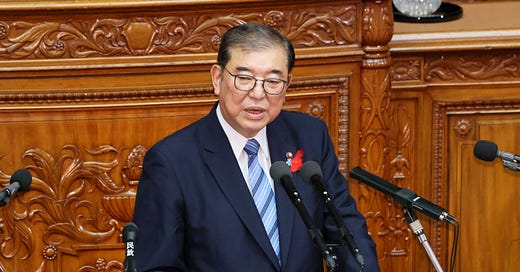The New Japanese Prime Minister's Foreign Policy
Shigeru Ishiba won the ruling Liberal Democratic Party (LDP) presidential election and was appointed Japanese Prime Minister.
On September 27, the ruling Liberal Democratic Party (LDP) presidential election was held, and Shigeru Ishiba won it. On October 1, he was appointed Japanese Prime Minister, and the new administration was established.
Former Prime Minister Fumio Kishida didn't run in the election because he had reluctantly decided to take responsibility for the corrupt relationship between the LDP and a religious organization, the Family Federation for World Peace and Unification(Former Unification Church, FUC) and the LDP slush fund scandal.
A former FUC leading member, Allen Wood, said the FUC's goal was to collapse the Separation of Church and State principle in the U.S., South Korea, and Japan so that the FUC could rule them. And the FUC got acquainted with politicians to avoid the police's investigation. Also, the FUC has extorted a large amount of money from its believers.
Though the Japanese Constitution prescribes the Separation of Religion and Politics, 179 LDP Diet members had some connections with the FUC. Notably, 121 LDP Diet members had a close relationship with the FUC, such as attending the FUC assembly, delivering a speech or a lecture, accepting donations, giving financial support, and receiving support in elections. New Prime Minister Ishiba gave a lecture at the FUC assembly and accepted its donation.
The slush fund scandal was that five major LDP factions had failed to report over ¥970 million($6.8 million) in campaign funds, and politicians had stored them in illegal slush funds. The Tokyo District Public Prosecutors Office prosecuted the three factions' treasurers in charge and several Diet members. Also, the LDP imposed penalties on the 39 politicians and gave the 45 politicians a warning. Though most factions were dissolved and then-Prime Minister Kishida amended laws to prevent a recurrence, politicians who committed the illegal act, including the factions' leading members, were not persecuted. In addition, how the politicians used the slush funds remains unclear. Japanese people are not satisfied with the LDP's response.
On October 3, Hiroshi Kamiwaki, a professor at Kobe Gakuin University, submitted a complaint to the Tokyo District Prosecutors Office that Ishiba and his treasurers had failed to enter the funds they had received. Ishiba also takes a negative attitude toward re-investigating to clear up the facts of the cases.
On September 30, new Prime Minister Ishiba announced to call a general election on October 27. He emphasized the need for immediate public approval of the new administration, but it is unusual to announce it before the inauguration. The LDP's relationship with the FUC and the slush fund scandal will be the issues of this coming election.
Ishiba thinks of himself as a security policy expert. He served as the director general of the Defense Agency from 2002 to 2004 and participated in dispatching the Japanese Self-Defense Forces(JSDF) to Iraq. For the first time, the Japanese troops were present in areas of active hostilities while legally required to remain within noncombat zones. He also served as Minister of Defense from 2007 to 2008.
On September 25, the Hudson Institute ran Ishiba's perspective on the future of Japan's foreign policy, and he declared that he would contribute to the peace and stability of the Indo-Pacific nations based on the U.S.-Japan alliance.
Ishiba said that his mission was to raise the U.S.-Japan alliance to the level of the U.S.-U.K. alliance. He insisted on revising the U.S.-Japan Security Treaty and Status of Forces Agreement to be an equal nation. Although he mentioned the possibility that the Japanese Self-Defense Forces would be stationed in Guam as an example, the Japanese people's burdens and dangers, which the U.S. military in Japan causes, will not be reduced.
He also advocated establishing the Asian NATO to deter China. He stated that a collective self-defense system like NATO in Asia was essential for mutual defense. The Asian version of NATO must also specifically consider sharing America's nuclear weapons or the introduction of them into the region.
Japan maintains the three non-nuclear principles, which state not to possess nuclear weapons, neither to produce nor to allow them into the country. To introduce U.S. nuclear weapons in Japan violates the principles.
Ishiba has expressed his view that Japan should not have its nuclear weapons. However, in September 2011, approximately six months after the Fukushima nuclear accident occurred, Ishiba said Japan should continue atomic power generation. Maintaining atomic power generation means having potential nuclear deterrence, which enables Japan to possess a nuclear weapon within a year if it wants.
Ishiba consistently shows eagerness to revise the Japanese Constitution. He wants to eliminate Article 9, paragraph 2, which prohibits Japan from maintaining "land, sea, and air forces, as well as other war potential" and "the right of belligerency of the state." To express readiness for the creation of the Asian NATO, he mentioned that the Japanese had reinterpreted the Constitution to allow the exercise of the right of collective self-defense.
However, the Sankei Shimbun reported that Jeffrey Hornung, a senior political scientist at the RAND Corporation, pointed out the U.S. would say no to the revision of the U.S.-Japan Security Treaty. Also, Kyodo News reported Daniel Kritenbrink, Assistant Secretary of State for East Asian and Pacific Affairs, said that it was still too early to establish the Asian NATO.
Ishiba will not be able to realize his desires, which the U.S. will reject. He can probably only follow the U.S. plan, as his predecessor Kishida did; Ishiba will increase Japanese armaments, leading to growing tension in Asia-Pacific.
Thank you for reading. If you enjoyed this piece, please share, subscribe, and support me. You can send a one-off payment safely from here using a credit card, Apple Pay, or Google Pay. Also, you can be a paid subscriber to my Substack.




